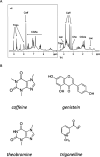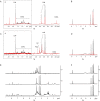Espresso Coffee Mitigates the Aggregation and Condensation of Alzheimer's Associated Tau Protein
- PMID: 37466260
- PMCID: PMC10401709
- DOI: 10.1021/acs.jafc.3c01072
Espresso Coffee Mitigates the Aggregation and Condensation of Alzheimer's Associated Tau Protein
Abstract
Espresso coffee is among the most consumed beverages in the world. Recent studies report a protective activity of the coffee beverage against neurodegenerative disorders such as Alzheimer's disease. Alzheimer's disease belongs to a group of disorders, called tauopathies, which are characterized by the intraneuronal accumulation of the microtubule-associated protein tau in fibrillar aggregates. In this work, we characterized by NMR the molecular composition of the espresso coffee extract and identified its main components. We then demonstrated with in vitro and in cell experiments that the whole coffee extract, caffeine, and genistein have biological properties in preventing aggregation, condensation, and seeding activity of the repeat region of tau. We also identified a set of coffee compounds capable of binding to preformed tau fibrils. These results add insights into the neuroprotective potential of espresso coffee and suggest candidate molecular scaffolds for designing therapies targeting monomeric or fibrillized forms of tau.
Keywords: Alzheimer′s disease; NMR; bioactive molecules; coffee; liquid−liquid phase separation; protein aggregation; tau protein.
Conflict of interest statement
The authors declare no competing financial interest.
Figures







References
-
- Carneiro S. M.; Oliveira M. B. P. P.; Alves R. C. Neuroprotective properties of coffee: An update. Trends Food Sci. Technol. 2021, 113, 167–179. 10.1016/j.tifs.2021.04.052. - DOI
MeSH terms
Substances
LinkOut - more resources
Full Text Sources
Medical

